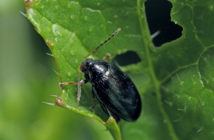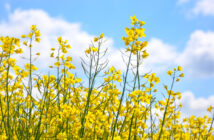Unlike last year there have been many chances to spray oilseed rape, according to Sarah Hurry, Technical Specialist with Dow AgroSciences. Many growers have taken the opportunity and have found an autumn spray window for post-emergence herbicides in winter rape and so have applied their Kerb and AstroKerb. But those with large acreages to spray who have not yet managed to find a suitable post-em slot in rape are reminded that they have up until the 31st January to do so; several more weeks. Sarah says that it is important to get rid of black-grass and other grassweeds in rape and use oilseed rape as a true break crop. Propyzamide has a different mode of action to herbicides used in cereals so it breaks the resistance cycle. AstroKerb contains aminopyralid that will be useful in controlling poppies and mayweeds.
Peter Waite of Dow AgroSciences says that some growers may be reluctant to spray in December or January as crop canopies are so large. “New trials work carried out last year in the UK has proven that Kerb Flo 500 can be applied to a full oilseed rape crop canopy and it makes no difference to the final levels of black-grass control achieved. Despite this concluding work, we know some growers still prefer to wait until the frost has opened up the canopy, but they must be aware of the label cut-off date,” warns Peter.
Applying propyzamide at this time of year means that growers need to be fully conversant with Stewardship issues and must do everything they can to avoid any herbicide getting into water courses. “We need to refocus and be responsible for minimising any possibility of water contamination. The Voluntary Initiative outlines a number of things to consider. Avoid spraying fields when field drains are flowing and don’t apply when heavy rain is forecast in the next 48 hours. Both Kerb and AstroKerb work well in December and right the way through to their final cut-off date, the 31st of January. But don’t spray when there is a high risk of water contamination,” he says.
“Kerb Flo 500 or AstroKerb contain the residual active ingredient propyzamide which works in a completely different way on black-grass to those herbicides commonly used in cereals. When these herbicides are used to their best effect in rape, there is a real opportunity to reduce the black-grass burden across the farm. If application conditions are right, farmers can expect levels of black-grass control from AstroKerb or Kerb Flo 500 frequently in excess of 90%. We have seen successful results from AstroKerb and Kerb Flo 500 applied in throughout December and January,” says Peter.
“But conditions must be right. In other words do not spray when there is any risk of contamination to adjacent watercourses. Soil temperatures need to be at 10°C and falling. most soils in the UK are below this temperature now. Soils also need adequate moisture. But if the soil is saturated, you need to be careful to avoid any run off. The ultimate decision to spray must always be based on local conditions, including the ability to travel and the potential risk to watercourses. Maintaining careful Stewardship of residual herbicides in oilseed rape is vital to ensure the long term availability of these important herbicides,” warns Peter.
“Propyzamide in Kerb Flo 500 is soil-acting, so spraying wet weeds after light rainfall is not an issue. In colder conditions its activity is prolonged and because frosts cause black-grass to throw out more adventitious roots, there is often improved uptake of propyzamide. Kerb Flo 500 can be applied in frosty weather. However do not spray onto frozen ground if rain is forecast as this could result in run-off into watercourses. AstroKerb contains the residual propyzamide plus the contact-acting aminopyralid and the broad-leaved weeds targeted, poppies and mayweeds, are best controlled when applications are made to a dry leaf.”
Spraying AstroKerb or Kerb in cold conditions, weeds take a while to die. “Weeds start to show symptoms and die when active growth recommences. You can look out for the classic symptoms of propyzamide-affected black-grass, such as swollen stem bases and purple or reddening discolouration. Propyzamide is known to work slowly and it can take up to three months to kill weeds. Be patient.”



